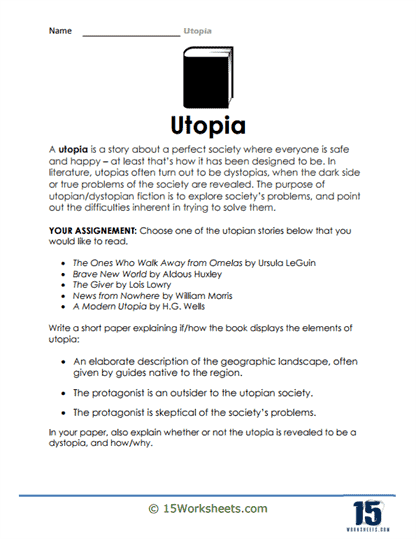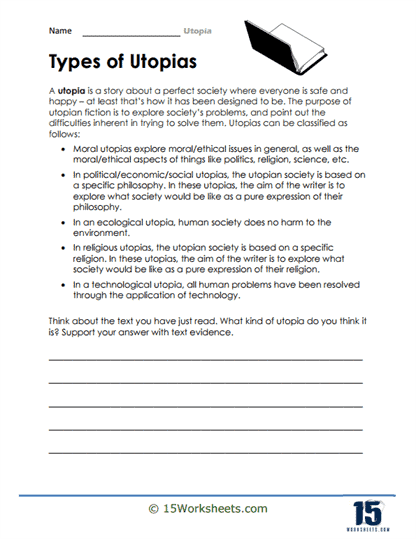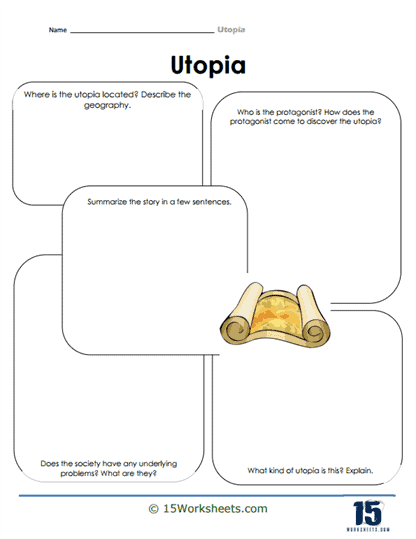Utopia Worksheets
All About These 15 Worksheets
Utopia, the concept of an ideal and perfect society, has long captivated human imagination and fueled discussions about a better future. Understanding utopia is not only important for exploring visionary thinking but also for fostering critical analysis, creative problem-solving, and a deeper appreciation of societal ideals.
This collection of 15 worksheets is designed to introduce students to the world of utopia, helping them grasp the importance of this aspirational concept, recognize its various forms, and develop their own critical and creative thinking skills.
What Are Utopia Worksheets?
Utopia is a term in literature that describes an ideal society or community, often imagined as a perfect place free from problems. The concept of utopia is used by authors to explore ideas of societal perfection, sometimes highlighting its impossibility or the problems inherent in such an ideal. Utopian literature provides readers with a lens through which they can view and reflect upon their own society.
These worksheets can be used to help students learn about the utopian concept and how it’s used in literature. Here are some of the exercises that you might find on these worksheets:
Definition and Examples – These worksheets start with a clear definition of utopia and then provide examples from various texts. This helps students understand the concept and see it in context.
Identification Exercises – Students are presented with a series of passages from different books and asked to identify which ones describe a utopian society. This would help them recognize how utopia is depicted in literature.
Comparative Analysis – Students will be asked to compare and contrast utopian societies in two different texts. This exercise would help them understand how the concept of utopia can vary based on different authors’ imaginations and societal contexts.
Discussion Questions – These types of worksheets include questions prompting students to think about the implications of a utopian society. For example, “What problems might arise in a seemingly perfect society?” or “What does the idea of utopia tell us about our own society?”
Creative Writing – This involves students creating their own utopian society, describing it in detail. They could consider aspects like government, education, environment, and social structures. This would allow students to reflect on what they consider ideal and also understand the complexities of creating a perfect society.
These activities help students understand the concept of utopia, recognize its use in literature, and engage in critical thinking about societal ideals and realities. The worksheet would also enhance their reading comprehension skills and stimulate their creativity.
What is the Literary Device of Utopia?
The term “Utopia,” coined by Sir Thomas More in his 1516 book of the same name, is a concept in literature that refers to an idealized society or community, often presented as a perfect place free from the usual problems or flaws of human civilization. It’s derived from the Greek words “ou” (not) and “topos” (place), effectively meaning “no-place” or “non-place,” an apt description for a society that’s practically unattainable.
The main defining feature of a utopia is its perfection, providing an idealized version of society that typically includes universal happiness, equality, prosperity, justice, and often, a harmonious relationship with nature. However, utopia in literature isn’t always about presenting a perfect world. It’s often used as a means to critique existing societies, to stimulate thought and discussion about social norms and values, or to show that the notion of “perfection” is relative and may not even be desirable.
Examples of Utopias in Literature
Example 1 – “Utopia” by Thomas More
In More’s “Utopia,” we get the original utopian work where he describes an ideal island society named Utopia. This society is characterized by communal property, equal education for both genders, religious tolerance, and a government chosen by the people. There’s no private property, and people rotate between city and country living to understand and appreciate both lifestyles.
More uses this fictional society to critique early 16th-century European society and to challenge readers’ assumptions about property and corruption. He presents the idea that a radically different society could exist, pushing readers to consider the possibility of social reform.
Example 2 – “The Giver” by Lois Lowry
Lowry’s “The Giver” portrays a society that initially appears utopian. It’s a world without pain, war, fear, or hatred. Every aspect of society is controlled, including family structure, careers, and even the climate. However, as the story unfolds, we realize that to achieve this “perfection,” the society has eliminated love, colors, music, and individuality – the very things that make life worth living.
In this novel, the utopia is revealed as a dystopia (a society where everything is imperfect). Lowry uses this utopian setup to question the nature of perfection and the sacrifices made to achieve it. It provokes readers to think about the value of individuality, emotions, and personal freedom.
Example 3 – “Walden Two” by B.F. Skinner
“Walden Two” depicts an experimental community where happiness, leisure, and personal fulfillment are maximized using behaviorist principles. The community lacks social problems like poverty and crime and is environmentally sustainable. Here, Skinner imagines a society that applies his psychological theories to achieve a more fulfilling life.
“Walden Two” showcases Skinner’s belief in the potential of behavioral science to improve society. He invites readers to imagine a world where science is used to maximize happiness and minimize conflict, asking us to reconsider our notions of freedom and control.
Benefits Of Utopia Worksheets For Students
Exploring the world of utopia through this collection of 15 worksheets offers students an opportunity to develop essential skills in visionary thinking, critical analysis, creative problem-solving, social and political awareness, and cultural and historical understanding. Utopia is a concept that invites students to dream of a better world and consider the possibilities of positive change.
By engaging with these exercises and activities, students not only enhance their academic abilities but also gain valuable tools for envisioning a brighter future, critically assessing societal ideals, and contributing to the pursuit of a more just and harmonious society. The benefits of studying utopia extend far beyond the classroom, empowering students to be visionary thinkers, critical analysts, and active participants in shaping a better world.















